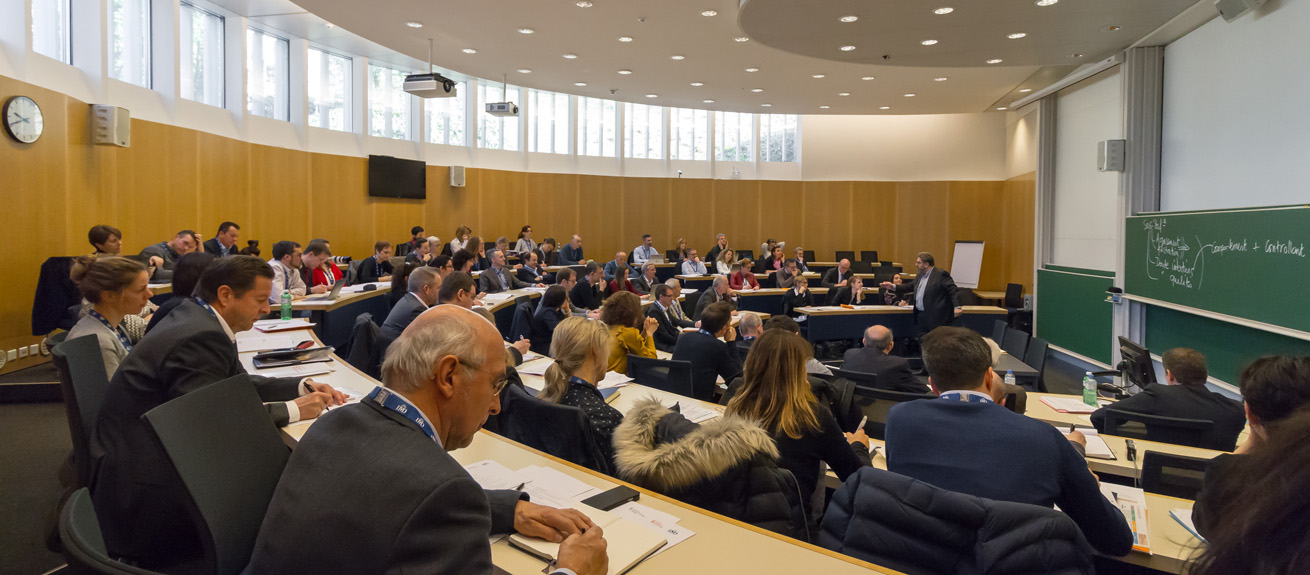
The Association for Global Health and Work recently held Module 4 of their conference series on Health and Companies at IMD.
The daylong event focused on mental health, ethics, and values from a managerial point of view. Participants ranged from business leaders and HR professionals to health professionals, and aimed to create a dialogue and mutual understanding in the fields of health and management.
Thierry Vial, Editor in Chief of PME Magazine, opened and moderated the event.
Strengthening local partnerships
IMD President Jean-François Manzoni welcomed the organizers and participants, highlighting that IMD has recently established partnerships with key institutions based in the French-speaking region of Switzerland, including with EPFL – the Swiss Federal Institute of Technology – and Ecal – the Lausanne-based University of Art and Design. “At IMD we are well known for working on the international level, but we are also strengthening our collaboration with local partners like the Association for Global Health and Work,” said President Manzoni.
“Given that many people spend more time at work than outside of work, this conference covers an especially important topic,” he said.
Professor Michel Guillemin, President of the Association for Global Heath and Work, put the event in context, remarking that the conference series has been innovative, ambitious and timely in tackling health and wellbeing in the workplace and cutting across disciplines. “We hope this conference series helps create a new sense of meaning work,” he told the participants.
Reconciling performance and benevolence
Next up Jean-François Manzoni led a session on the theme of “How to reconcile performance and benevolence”. Do benevolent managers bring out high performance? According to Manzoni the answer is definitely yes. Backing this up, he presented findings from studies that show how in periods of economic downturn people innovate less. However, there can be too much of a good thing, said Manzoni. “The biggest problem is the management of underperformance.”
Underperformance by employees often results in managers piling on more pressure, creating additional stress – which is known to decrease performance – resulting in a vicious cycle. “It’s a self-fulfilling prophecy,” Manzoni said.
According to Manzoni the only way to break the cycle is for the manager to be conscious that the problem exists and to communicate. Managers also must avoid labelling their employees and try to understand the cause of their underperformance.
“Managers also have to pay attention to their own behaviour; when we’re on automatic pilot, habits always win,” Manzoni said. The set-up-to-fail syndrome, a book by Jean-François Manzoni and Jean-Louis Barsoux, describes this dynamic further.
Emeritus Professor at INSEAD (Fontainebleu, Singapore), Henri-Claude de Bettignies presented an approach he developed called AVIRA (Awareness, Vision, Imagination, Responsibility and Action) that explores the tensions between performance and benevolence in a structured and coherent way. This methodology was used during the morning and afternoon workshops, providing the opportunity for participants to dive deep in the subject of the day and to share their experiences. Professor de Bettignies gave a concise and pedagogical summary of the outcomes of the workshops.
Professor Lazare Benaroyo of the University of Lausanne said that both organizations and employees need to find common ground in a ‘third space’ where they are not only focusing on their own interests. “We need to go from individualism to a sense of community.”
Several other speakers gave important insights throughout the day: Professor Jacques Besson of the University Hospital of Vaud, psychiatrist and expert in neurosciences. linked his area of study to health and companies. André Schneider, Director-General of Geneva Airport shared experience from the field, and Dr. Fabrice Althaus, Director of Health at the International Committee of the Red Cross, stressing the ethical aspects of the duty of protection, illustrated how this topic is relevant, broad and decisive for both individuals and companies.
Read Jean-François Manzoni discuss the event in an interview with PME Magazine (in French).


